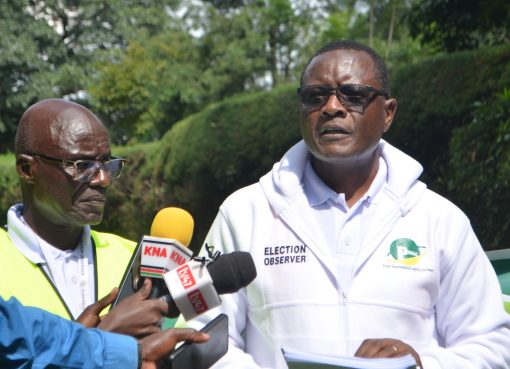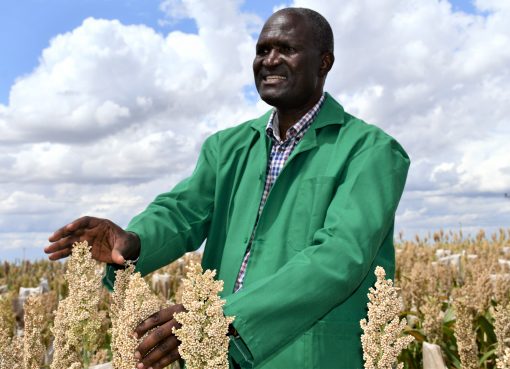The Government has prioritized sustainable farming practices in its policies and budget to ensure food and nutrition security and build resilience against climate change shocks.
Agriculture Cabinet Secretary Peter Munya said various State agencies in collaboration with partners from county governments, local and international firms and research institutions were building capacity of both small holder and large-scale farmers in practicing sustainable agriculture in Kenya towards improving crop yields, stimulating the economy and helping mitigate climate change.
Munya noted that agriculture is hugely vulnerable to climate change, particularly in Kenya, where crops rely on regular, sufficient and predictable rainfall.
“Changes in temperature and precipitation patterns have created extreme weather conditions such as flash flooding, drought and locust invasions that have not only slashed crop yields, but fuelled regional conflict over diminishing access to essential resources,” said the CS.
Speaking when he inaugurated the annual Agricultural Society of Kenya (ASK) trade fair in Nakuru, Munya stated that the partnership was also building resilience in smallholder farming and pastoral communities that depend on rain-fed agriculture through scaling up climate-smart agricultural practices, strengthening climate-smart agricultural research and seed systems, and supporting agro-meteorology and advisory services.
“Sustainable agriculture is about increasing profitable farm income, protecting the environment, enhancing quality of life for farming communities and increasing production for human food and fibre needs,” he stated.
The trade fair which resumed after two years lull due to the Covid-19 pandemic, has attracted 313 exhibitors, a drop from 330 exhibitors who participated in the 2019 event.
As part of the Big Four Agenda, Munya affirmed that the government was implementing measures and interventions to achieve food and nutritional security for all Kenyans.
These measures include supporting large-scale production of staple food, expanding irrigation schemes, increasing access to agricultural inputs, and supporting small-holder farmers to sustainably produce and market commodities.
Meanwhile, the National Treasury has proposed in its 2022/2023 budget statement to issue Sh147 million for the Climate Smart Agricultural Productivity Project and Sh850 million to enhance drought resilience and sustainable livelihood.
About Sh1.5 billion will be given for the small-scale irrigation and value addition project.
The food and nutrition sector will receive Sh46.7 billion in the budget.
Munya listed some of the climate smart agriculture practices as development and use of drought and heat tolerant crop varieties, finding use for waste products from crops, training on the costs and benefits of crop insurance, reduction of post-harvest losses through support of agricultural machinery, adoption of biological pesticides for green gram farmers, conservation of agriculture practices such as zero tillage and mulching, adoption of a warehouse receipting system and making use of waste material for biogas.
“For pastoralists, the practices entail shifts in herd composition from cattle to goats and/or camels, while in dairy farming it involves providing feed supplementation to increase productivity, providing of adequate water, improving collection systems to reduce spoilage and biogas systems to provide household energy and reduce emissions from manure,” he explained.
According to the CS, aquaculture entails development of integrated systems that utilize waste from chickens raised for eggs or meat in fish farming to reduce costs of fertilizer and feed and maximize profits and adopting finger-pond technology through digging ponds in wetlands that are naturally filled with water and stocked with natural fish when lake levels rise.
Munya indicated that the 2022-2026 Climate Smart Agriculture Multi Stakeholder Platform strategic plan (CSA-MSP) being spearheaded by the Ministry of Agriculture, aims to equip farmers with adaptation practices on climate action, geared to increase food production hence, reducing the food prices.
He said that hundreds of farmers’ groups in Arid and Semi-arid regions had been trained on climate-smart agriculture and provided with material support such as certified drought-resistant seeds, farm implements and animal supplements for increased productivity.
The communities were also being trained on how to cope with the climatic disasters in regard to natural resource and risk management in order to be self-reliant.
“The training has also been targeting fodder production to avert community conflicts witnessed during dry spells and to prevent the animals from getting emaciated and dying. Our main focus is on building climate-resilient communities and empowering local institutions,” Munya added.
He revealed that the Kenya Agricultural and Livestock Research Organization (KALRO) was developing a variety of seeds, goat and cattle breeds that apart from being high yielding were resistant to drought and diseases.
And as one way of coping with climate change, the CS urged Kenyans to embrace urban farming through establishment of kitchen gardens, while diversifying from maize into coffee, passion fruit, pyrethrum, macadamia, avocado, potato and vegetable farming.
He said development of a new wheat variety that was resistant to rust would reduce the country’s dependence on imports.
Munya hailed Egerton University for developing five new sorghum seed varieties that are designed to yield industrial raw materials in the manufacture of alcoholic beverages, bakery products, animal feeds and ethanol.
By Anne Mwale and Mercy Syombua





